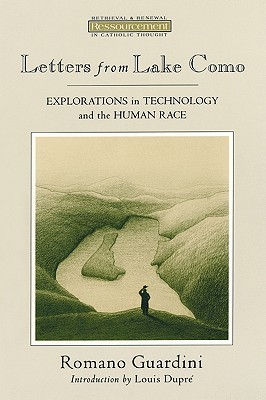Romano Guardini (1885-1968), a Roman Catholic priest and professor of Christian philosophy at the universities of Breslau, Berlin, Tubingen, and Munich, was a year old when he emigrated with his parents to Germany from his native Italy. Returning to his homeland after many years, Guardini found himself confronting the physical reality that he had both predicted and described in his theoretical speculation. As Louis Dupre says in an introduction, “If Guardini’s theoretical works contain the justification, the Letters present the vision.” “Inexpressible beauty is here,” Guardini wrote of the valleys of Brianza, “but it gives me no joy. I do not see how any understanding person could find joy in it.” What he understood was that the poignant beauty he saw everywhere around him was doomed, as immemorial human culture, which he defined as the living relationship between human beings and nature, succumbed to the onslaught of a barbarous technology presenting an artificial alternative to nature, and creating basic forms of human existence filled with something other than their own contents: something abstract, not living. Christian optimism and philosophical good taste restrained Guardini from sentimental pessimism, and even permitted him to discern in the coming novus ordo seclorum a new civilization in some wavs equal and perhaps superior to the one which came before. While those born under the old dispensation could never adapt themselves to such a world, generations to come might nevertheless succeed in inventing new but equally human relationships within a culture transformed by the logic of technique. “We need to be a little imaginative. Utopias have so often become the reality that imagination is legitimate. . . . Human existence has advanced so far, humans have taken so big a grip of themselves, the possibilities of achievement and destruction have become so incalculable that the time has come for a new virtue, a new skill in intellectual government in which, made serious by so much experience, we can break free from entanglement in departmentalized spheres of thinking and life. That is what might take place in these best among us.” Seventy years after the first independent publication of the Letters, the “great favor of history” for which Guardini hoped appears not to have been granted. Rather, the view from the end of the 20th century suggests that technology will certainly triumph as a destructive force unless man’s moral evolution matches and exceeds his intellectual development, and men succeed in subordinating their intellectual will to their moral imagination. The enlightenment of the mind by itself is insufficient.
[Letters from Lake Como: Explorations in Technology and the Human Race, by Romano Guardini (Grand Rapids: Eerdmans), 115 pp., $9.99]

Leave a Reply